17th September 2025
For our Eleventy First session it was a three table, 12 player and 5 different games night, of which 3 were new to the club.
A full four person table of Skara Brae had been pre-booked on Discord so Steph set about setting it up as soon as she arrived and it was short enough and popular enough that there was time for two games.
Iain, Steph and Darren reprised their roles (from the previous pub games session) as chieftains of the Orkneys, and were joined by Dan in his first try of the game. This is a set collection and resource management game, the sets coming from cards, and the resources coming from a collection to rival a Splotter in terms of numbers, but much nicer and more tactile than tiny cardboard chits. The cards mainly depict villagers who are experts in their respective terrain types - Shore, Hills, Thickets and Fields – as well as Roofs, Stone Balls and Utensils, whilst the numerous resources range from wood and stone, through seaweed to fish, rabbits and the mighty cow, plus the all-important skaill knives (knapped sandstone blades). Over four rounds of three turns players pick a card from the selection available (number of players plus one), add it to their village below their player board and then place a worker on one of their action tiles to gather, furnish, cook, craft, trade, clean or take their special action (chosen from two random options dealt at the beginning of the game).
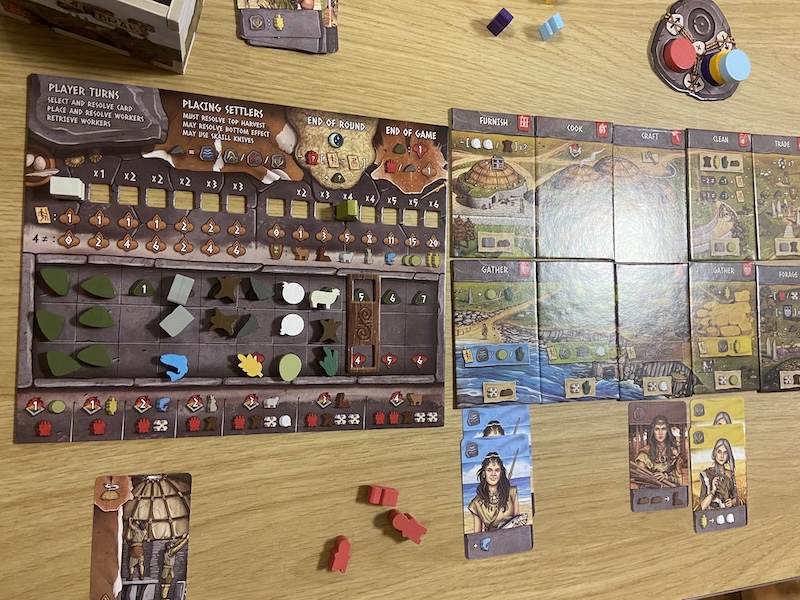
Cleaning is a vital aspect of resource management, as the waste created by the village produces midden at the end of the round, filling resource spaces – and the more spaces you fill, the more midden is created, making it easy to start a runaway feedback loop of ever increasing midden as cleaning is the only way to rid yourself of midden, which is worth negative points at the end of the game. Cooking is required to feed your village at the end of the round to prevent village deaths, but cooking also creates resources. Cooking some wheat creates a bit of food, cooking a cow provides 2 bits of food, a hide and two piles of bones – all of which need to go into storage before being used. Crafting allows you to flip one of your action tiles (provided you have the correct resources to do so) which upgrades it into providing a better version of the action as well as providing some points.
Roof cards can shelter one of your villagers and apparently stave off their hunger so you can forgo feeding them, and are also worth points. Utensils gain you a hide, increase your cooking capacity and reduce the midden you create, as well as earning points. Stone balls make your village look pretty. And get you a skaill knife. And some points. But mainly they make your village look better than the villages without stone balls.
You start with one worker, and each round gain an additional worker as your village grows. All the cards for the round are laid out at the start of the round, and there is the option of playing or passing on your turn, with a pass pushing your move back in this turn but going earlier next turn. Handy if you’re desperate to grab that stone ball from the next set of cards – or maybe a particular villager if that’s more your thing (sets of all 4 villager types can be leveraged for more points).
Dan ‘Tidsear Dànaidh’ took the Innovate tile, allowing him to use bones and food to upgrade tiles in place of their allocated resources, while Iain ‘Oifigear Caisean-feusaig’ went with Boar Hunt, granting him boars, a resource not usually available. Steph ‘Eòlaiche Steaphag’ chose Muster, meaning she could interchangeably use the abilities on her tiles, and Darren ‘Famhair Purpaidh’ decided on Tend Land so that he could take multiple gather actions, getting more resources to clean up later. Early moves saw Dan and Iain both make sterling progress towards starting their own reality show ‘Neolithic Hoarders’ as their storage filled faster than they could clear it. Steph was struggling to create full sets of villagers but was moving up on Furnishings which would score said villagers highly, and Darren was bemoaning the distinct lack of Stone Balls and Roofs that had been dealt, meaning he had to contend himself with taking bothersome villagers who would need feeding later.
Cows were killed, rabbits were skinned, and lots of muttering was heard. Should I cook early? Where am I going to put that wood? Can I clean that? Stone or wood? Stone or wood? Stone OR wood? Rule #1 of Skara Brae Club: If you’re not muttering to yourself over your player board, you’re not really playing the game. A few villagers got culled along the way – Aunty Freya’s gone to work on the big farm over the water – and there was some mild bickering among chieftains when that lovely young man with the fishing rod went off to fish for another village, but mainly the Orkneys of ancient times were a peaceful place.
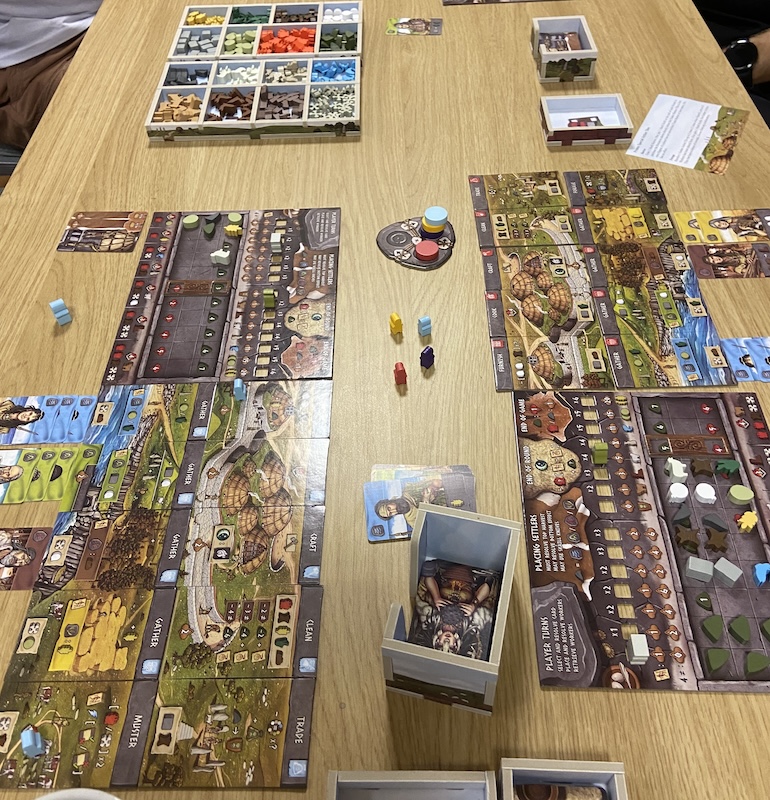
The close-knit communities relied on the old ways handed down through generations, distrusting any new-fangled ideas, which was to Dan’s advantage as his innovations led him to victory, with Steph’s sensible spread of skills putting her just behind. Meanwhile Darren’s village looked lovely, and Iain’s boars were keeping him too busy to creep past into third.
Time passes however, and before you knew it the next generation was vying for leadership, each vowing to do better than their forefathers. This time round Dopple-Dan went for Explore, hoping to find potential recruits and items beyond the village walls. Steph the Second’s clan were focusing on Build, honing their skills to use less resources, and Iain’s Inheritor was Spinning Wool. Darren’s Descendants stuck to their traditional roots, continuing to Tend Land, as they had thought it could be done better than it had in the past (having looked a bit closer at the cards being used).
At least these skills are what could be discerned from the ancient records, unfortunately this scribe’s skill in ogham are rusty and these could just be fables mis-told through the ages (although he’s certain he has recorded Dan’s and Darren’s correctly).
Skara Brae: The Next Generation went to work a bit quicker than their forebears, hopefully having learnt some tricks, although a lack of Stone Balls in the early days did mean that Darren was soon regaling the rest of his village with tales of how Sigurd the Brave had been swept out to sea defending the isle from sea serpents, and had definitely not starved to death due to poor planning and a focus on style over substance by the village elders. Iain’s villagers were struggling to find their way through the mounting piles of midden, and in the village of Steph there seemed to be general disgust at the way this resource turned into that resource when it was really those resources that were needed. In Dan’s village meetings there was plenty of moaning about how little good there was to come from traipsing over the island looking for lost sheep, but it turned out the villagers knew not of what they spoke, for once again Dan found himself Laird of the island. The artisanal knives and balls of Darren’s village this time garnered a second place, followed by Steph and Iain.
The boat, the cruik, the ploo [plough],
Horn, corn, lint and yarn,
Flax and tarry oo [wool].
On another table, four players started with a short game while other people were gathering: Kingdomino - laying 2-section tiles with the aim of completing a 5x5 grid around the central tower. Points are awarded based on the size of each section of terrain (fields, lakes, mountains, forest, …) multiplied by the number of crown symbols on that section. Kathy won the first game with 57, Graham came second with 51. Kathy then switched tables after her win and James joined to make a different 4 for the second game. Graham messed up the 5x5 grid, and despite a spot of remodelling (cheating), came in a distant last place with 34 points. Neil was the winner with 66 points.
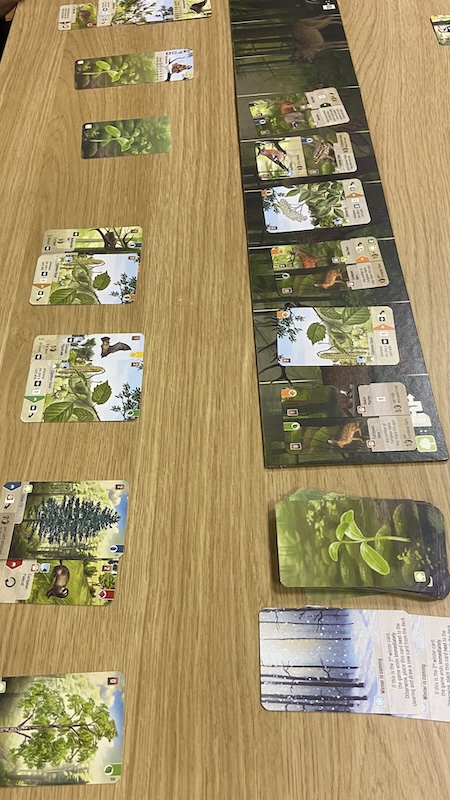
They then played Forest Shuffle, with expansion packs “Woodland Edge” adding bushes and “Exploration” adding caves. This added variety to the game. In this card game, each player plants trees, and then adds animals to them. Play ends immediately on finding the 3rd winter card. We did not manage to grow as many trees as with the normal game. James T won the first game with 29, Graham bringing up the rear with 11!! We did better on the second game: James won with 66, Graham (again last) more than doubled his previous score to 23.
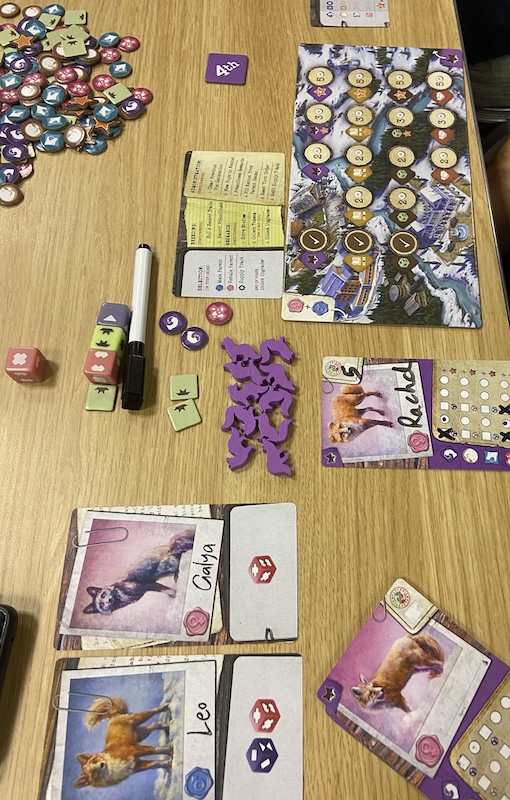
Then a longer game of The Fox Experiment, new to the club. In each round you’ll select a pair of fox parents who have certain traits. You’ll gain those specific trait dice, roll them, then try to move them around to make complete trait symbols which you’ll then mark off on your pup card. You’ll then gain trait tokens depending on how many traits you marked off which you’ll use to upgrade tracks on your personal player board. At the end of the round, the previous generation of foxes will be cleared and all of the new pups will be moved to the kennel — thus becoming candidates to be chosen as parents in the next round.
The game ends after 5 rounds and you’ll gain points for pleasing patrons (end of game scoring bonuses), studies completed (personal player objectives), if you ever won the friendliest fox award, upgrades on your personal player board, and extra tokens. We were rapidly gaining extra dice, extra foxes, etc. In each round you chose a male parent, a female parent, and your turn order for the next round. This makes an interesting choice as to which to go for first - get the best fox, or get a good turn order for next time. Graham, who was convinced he was doing badly (the eternal optimist!!), was early in choosing the foxes for the last round - which enabled him to get good foxes and gave him a surprising win. A good game, and worth playing again.
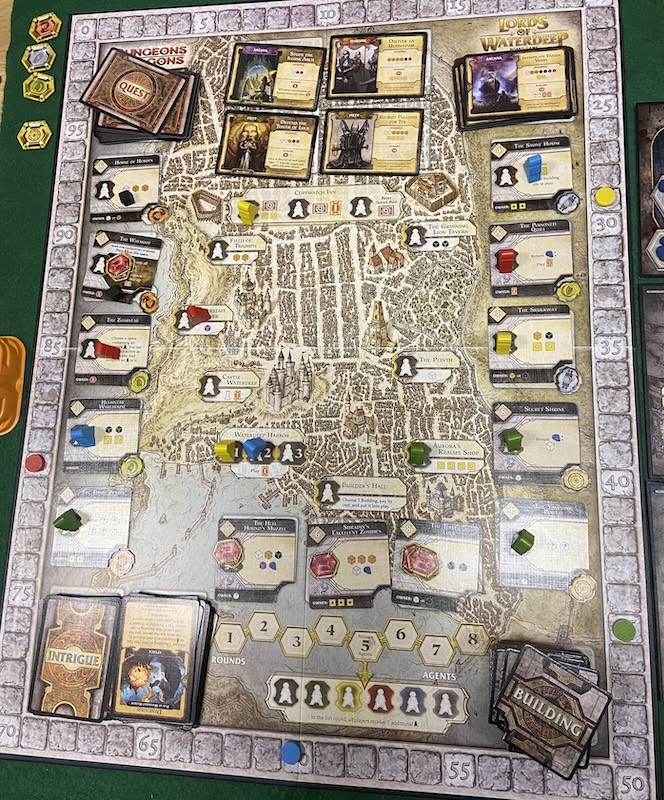
Reynaldo had pitched Lords of Waterdeep with the “Scoundrels of Skullport” expansion on Discord a few hours before the session started and was soon joined by Kathy, Neil and Dave. The gameplay is quite simple worker placement over eight rounds, each player starts with 3 workers and gains another in round five. They take turns placing their workers in buildings on the gameboard (only one worker per building) and then gain a perk from that location - usually adventurers (in 4 flavours; black rogues, orange fighters, white clerics or purple wizards), money, additional buildings, take quests, gain or use intrigue cards or in the Skullport expansion buildings with better perks but also corruption (negative points at end of game). There are only a few more buildings than workers so the strategy is in the order you select your placements and adapting if those choices get blocked by the others. Intrigue cards can be played for benefits like getting a worker back to redeploy later or to sabotage the opposition like making them go on a minor quest using up adventurers before they can complete their intended bigger value quests. Each player also has a unique Lord card giving an end game bonus for completing certain quest types.
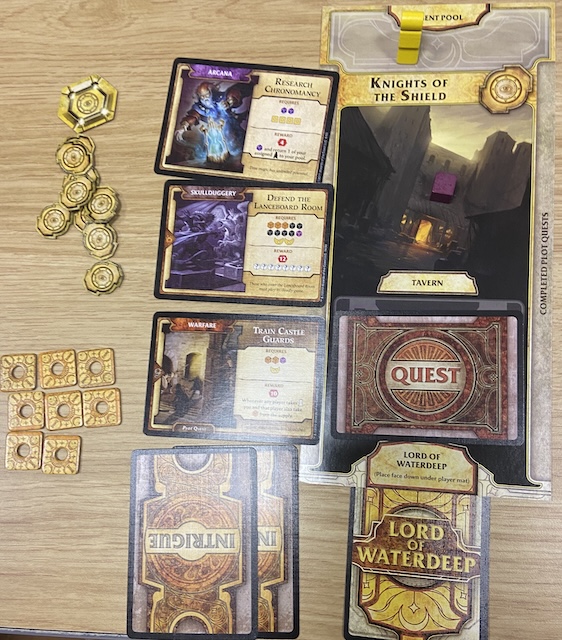
After a rapid start with Kathy finishing the first quest it was Neil and Dave that took the lead with some big value quests. Kathy and Reynaldo had closed the gap by the end game but were still behind and the reveal of the Lord card scores meant everyone had gained either 28 or 32 more points making no real difference to the final scores. A fun game, quick to teach and learn and lots of tricky strategy decisions.
The next session is the 1st October, come along on the night for more varied games or join us on Discord in advance if you want to suggest a game or reserve a slot on a table for the pre selected games.
- Total Session Attendance: 12
-
Board Games: